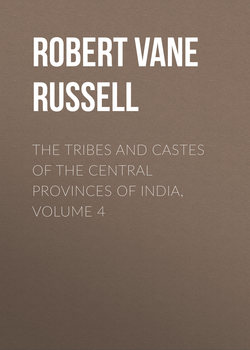Читать книгу The Tribes and Castes of the Central Provinces of India, Volume 4 - Robert Vane Russell - Страница 5
Part II
Articles on Castes and Tribes
Kumhār—Yemkala
Vol. IV
Kumhār
4. The Kumhār as a village menial
ОглавлениеThe Kumhār is not now paid regularly by dues from the cultivators like other village menials, as the ordinary system of sale has no doubt been found more convenient in his case. But he sometimes takes the soiled grass from the stalls of the cattle and gives pots free to the cultivator in exchange. On Akti day, at the beginning of the agricultural year, the village Kumhār of Saugor presents five pots with covers on them to each cultivator and receives 2½ lbs. of grain in exchange. One of these the tenant fills with water and presents to a Brāhman and the rest he reserves for his own purposes. On the occasion of a wedding also the bridegroom’s party take the bride to the Kumhārin’s house as part of the sohāg ceremony for making the marriage propitious. The Kumhār seats the bride on his wheel and turns it round with her seven times. The Kumhārin presents her with seven new pots, which are taken back to the house and used at the wedding. They are filled with water and are supposed to represent the seven seas. If any two of these pots accidentally clash together it is supposed that the bride and bridegroom will quarrel during their married life. In return for this the Kumhārin receives a present of clothes. At a funeral also the Kumhār must supply thirteen vessels which are known as ghāts, and must also replace the broken earthenware. Like the other village menials at the harvest he takes a new vessel to the cultivator in his field and receives a present of grain. These customs appear to indicate his old position as one of the menials or general servants of the village ranking below the cultivators. Grant-Duff also includes the potter in his list of village menials in the Marātha villages.5
5
History of the Marāthas, edition 1878, vol. i. p. 26.
